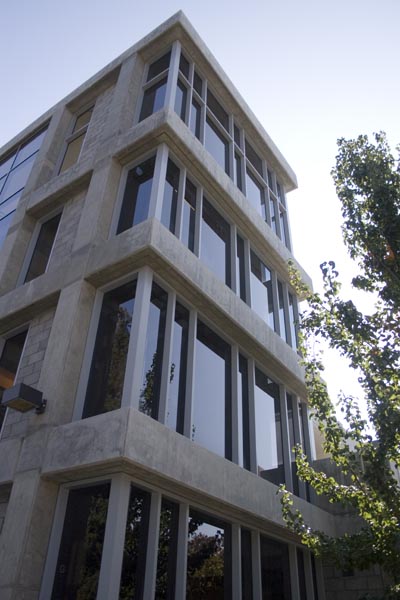ASI parking legislation delayed

Parking Structure. Elizabeth O’Keefe
November 28, 2007
Associated Students Inc. student-only parking legislation will be split into two separate pieces, ASI President Christina Romero said.
The legislation was originally supposed to be passed at the Oct. 31 board meeting but was postponed after a number of board members requested clarity.
“I combined two issues into one…I think that made it too confusing for everyone,” Romero said.
The legislation was then scheduled to be presented, discussed and passed at ASI’s Nov. 7 special board meeting, but was delayed again after Romero asked for more time to split the legislation into two separate issues.
Romero said the first piece of the new legislation will be presented to ASI today at the official board meeting, and will focus on “student-only parking access.”
Romero said students lost their student-only parking privileges last spring during contract negotiations between the California Faculty Association and the California State University. Romero said the legislation will advocate for the faculty and the chancellor to go back to the negotiating table.
According to the legislation, “the cost of staff and faculty parking still remains significantly lower than that the cost of student parking fees, although the majority of Sac State students are at a significantly lower economic status.”
Currently, students pay $108 for parking permits while faculty members pay $64.89, according to the Sac State University Transportation and Parking Services website.
Romero said after the first legislation is passed, she will work on writing a second piece of legislation that will focus on more “equitable” fees for students.
“The requests for the equitable parking will not be included in (the first) legislation, it will be included in a future piece of legislation,” Romero said. “How soon depends on the response from people around campus.”
Romero said she plans to ask for student opinions to see what they would define as “equitable.”
“I’m trying to decide if I’m going to request for (all fees) to be equal or for faculty and staff (parking privileges) to be equivalent to students,” Romero said.
Junior business major Rose West said she hasn’t paid much attention to ASI, but she would like to see the legislation finished “as soon as possible.”
Junior psychology major Cassandra Perryward agreed, but said she doesn’t expect the student-only parking issue to be solved any time soon.
“That’s the power of bureaucracy,” Perryward said.
For the situation to change, the CSU Board of Directors and the CFA negotiating team would have to renegotiate faculty contracts for all 23 CSU campuses.
Perryward said she thinks this is unfair because a large portion of the money that built the parking structures came from student fees.
“I don’t believe the chancellor had the right to negotiate with what’s not part of his budget,” Perryward said.
Romero said she hopes to gain support from students as well as the California State Student Association.
Romero attended the CSSA meeting at CSU Northridge Nov. 9 through Nov. 11 where she discussed an action item about parking which was brought forward by Fresno State’s ASI.
“(CSU Fresno’s ASI and myself) were working on it together…it takes a more aggressive approach and that’s not my style,” Romero said. “I will advocate it at as long as it’s not offensive.”
Romero said she wants to work with the faculty and have an open dialogue.
“My style is to talk to everyone,” she said.
Faculty Senate designee David Rolloff attends ASI official board meetings. He said he is undecided about the legislation, but likes the open dialogue.
“Christina (Romero) is the most responsible president I’ve seen in office and I’ve got faith in her….When she talks, I listen to her,” Rolloff said.
Rolloff believes students are bearing increased burdens of operational costs on campus, but said many faculty have been “dedicated for decades” to their jobs.
History professor Michael Vann said he doesn’t like how faculty has to pay for parking.
“I don’t think I should have to pay for the privilege to park at my work,” Vann said. “It’s ridiculous. It was even more ridiculous last year when I couldn’t find parking. That’s part of my paycheck going to pay for the parking where I work.”
Vann said he does, however, sympathize with students and the financial burdens most of them carry.
“I love my students and their parking fees are too high…but classes won’t happen if I’m not here,” Vann said.
CFA Communications Director Alice Sunshine said she would like to work with students to resolve the issue.
“We agree there really needs to be an equitable solution to this issue,” Sunshine said. “It’s not a completely simple issue to resolve, but the faculty have long felt that all parties affected…need to…get together and hammer out a deal that’s fair. We want (everyone) to get to the table together and not see a unilateral decision made.”
Nancy Fox, UTAPS director, said she believes students will have to continue paying more until and unless all sides come to terms and sign a revised agreement.
“Students pay a disproportionate share of parking fees….I would prefer to see more equitable parking fees paid by all members of the campus community,” Fox said. “Our job is to manage the parking facilities and provide parking services, What happens at the bargaining table between the CSU and employee unions is handled at chancellor’s office level.”
Romero said she hopes to speak with everyone soon, but admits student-only parking is a “long-term goal.”
Andres Perez can be reached at [email protected].





























































































































